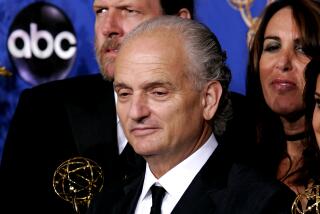Even for Tony, a murder most foul
- Share via
FORMER HBO chief Chris Albrecht reportedly had a problem with a scene in the first season of “The Sopranos” where Tony Soprano kills a guy while touring colleges in Maine with his daughter Meadow.
Albrecht worried viewers would be turned off, witnessing the show’s protagonist murder a man in cold blood. But the episode is widely regarded as a turning point in the success of “The Sopranos,” emblematic of the series’ ongoing allure -- the Machiavellian brutality of the mob on the one hand, and the more quotidian aspects of upper-middle-class immigrant striving on the other.
For the record:
12:00 a.m. May 16, 2007 For The Record
Los Angeles Times Wednesday May 16, 2007 Home Edition Main News Part A Page 2 National Desk 1 inches; 36 words Type of Material: Correction
“The Sopranos”: The On TV column in Tuesday’s Calendar misstated Tony Soprano’s line at the end of Sunday night’s episode of “The Sopranos.” Standing in the desert, Tony screamed, “I get it!” not “I did it!”
That cocktail is on its last fizz: Sunday night, Tony Soprano (James Gandolfini) offed his nephew Christopher (Michael Imperioli), and in the nephew’s dying eyes our beloved protagonist became, finally, despicable and lost, beyond empathy. If it once seemed a stretch to begin a series in which the main character commits murder, what shocked Sunday was that Tony kills and we don’t sympathize.
Series creator David Chase has been working back to this place since his Tony Soprano became perversely loved by millions. Now I’m just waiting for him to die (or be caught, or live on, though probably he’ll die). Even Gandolfini seemed to keep himself particularly dead-eyed and isolated for the hour, in which he saw his closest lieutenant dying before his eyes after the two were in a car wreck. He dialed the numbers 9 and 1 on his cellphone before deciding that his own life would be easier, all in all, without the kid, whose drug addiction was bound to get them all ensnared by the feds, and who had meanwhile committed a more complicated, literary sin: He’d embarrassed the boss by portraying him as a simpering, bloated bully in a slasher movie called “Cleaver.”
If Tony was too dense to realize it at first, Christopher’s betrayal came in handy, finally. Although this time, as Tony distanced himself from his guilt -- railing at the hypocrisies of the living and the dead -- you watched him not with vicarious pleasure but at a cold remove. Not since the death of Christopher’s fiancee Adriana have we watched a character die and felt not for the doer but the victim (in this case, a killer himself, but one who spoke vulnerably in rehab, and made fitful stabs at getting out of the life and dreamed Hollywood dreams).
Tony Soprano had gotten away with murder before, but in each instance the writers left us bread crumbs back to understanding, and you followed this trail dutifully -- this guy was a mob informant (Big Pussy), that guy had it coming (Ralph Cifaretto).
There was rage and remorse on Tony’s inside, and an adherence to the laws of his jungle on the outside. Like Showtime’s
serial-killer drama “Dexter,” “The Sopranos” codifies its main character’s barbarous acts so that we experience them, against all odds, as destiny, and thus, in a way, forgivable. It’s
the advantage of fiction; in real life you get away with stuff until you don’t, at which point it’s ugly, and unaccompanied by a soundtrack (see Albrecht, who shepherded “The Sopranos” to air and had his own fall-from-TV-grace last week, which has landed him in rehab, to say nothing of show business jail).
Chase, you figure, has envisioned a monumental exile for his main character in the end. Sunday night’s episode concluded with Tony in the Nevada desert, loaded on peyote after an all-nighter with one of Christopher’s goomahs, screaming, “I did it!” His face was a riot of tears, torment and unbidden glee. It had to have been the best acting performance of Gandolfini’s “Sopranos” career, and maybe the show’s best tableau: The mob boss hallucinating like some exiled Lear in the Nevada desert, with a beautiful girl -- brainy and exotic, stripping to pay for college -- as his Fool.
More to Read
The complete guide to home viewing
Get Screen Gab for everything about the TV shows and streaming movies everyone’s talking about.
You may occasionally receive promotional content from the Los Angeles Times.






